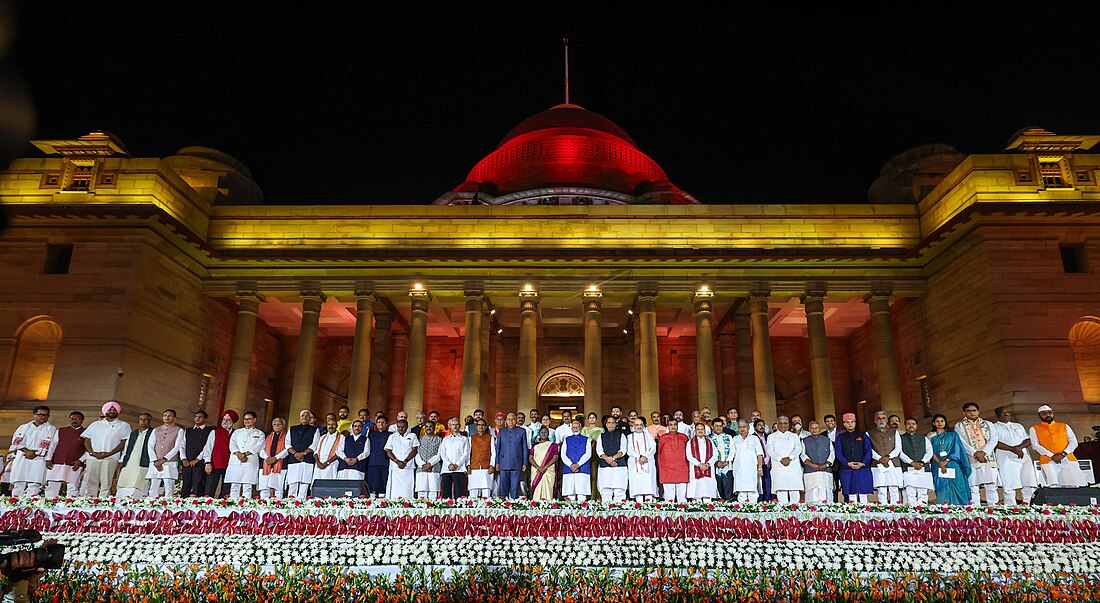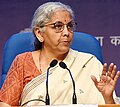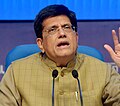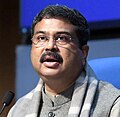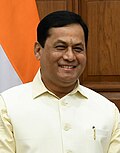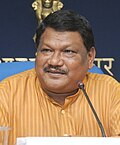Top Qs
Timeline
Chat
Perspective
Union Council of Ministers
Principal executive body of India From Wikipedia, the free encyclopedia
Remove ads
The Union Council of Ministers is the principal executive organ of the Government of India, which serves to aid and advise the President of India in execution of their functions.[1] It is chaired by the Prime Minister of India and consists of the heads of each of the executive government ministries. Currently, the council is headed by Narendra Modi and consists of 71 fellow members. The council is answerable to the Lok Sabha.[2]
This article needs additional citations for verification. (May 2024) |
A smaller executive body called the Union Cabinet is the supreme decision-making body in India; it is a subset of the Union Council of Ministers who hold important portfolios and ministries of the government.[3][failed verification]
Remove ads
Regulation
Pursuant to Article 75(3), the Council of Ministers is responsible collectively to the lower house of the Indian parliament, called the Lok Sabha (House of the People).[4] The council of ministers upon losing the confidence of Lok Sabha shall resign to facilitate the formation of a new council.
A minister can take any decision without being considered by the council of ministers per Article 78(c). If needed, all union cabinet members shall submit in writing to the President to propose a proclamation of emergency by the president in accordance with Article 352.
According to the Constitution of India, the total number of ministers in the council of ministers must not exceed 15% of the total number of members of the Lok Sabha. Ministers must be members of parliament.[a] Any minister who is not a member of either of the houses of the parliament for six consecutive months is automatically stripped off his or her ministerial post.[4][b]
Remove ads
Ranking
There are five categories of the council of ministers as given below, in descending order of rank:
- Prime Minister: Leader of the Union Council of Ministers.
- Deputy Prime Minister (if any): Presides as prime minister in his absence or as the senior most cabinet minister.[5]
- Cabinet Minister: A member of the Union cabinet; leads a ministry.
- Minister of State (Independent charge): Junior minister not reporting to a Cabinet Minister.
- Minister of State (MoS): Deputy Minister reporting to a Cabinet Minister, usually tasked with a specific responsibility in that ministry.
Remove ads
Appointment
Pursuant to Article 75, a minister is appointed by the President on the advice of the Prime Minister and functions until the pleasure of the President of India. Since at least the turn of the millennia, evidence indicates that an MP's electoral performance enhances the likelihood of being granted a ministerial portfolio.[6]
Removal
- Upon death
- Upon self resignation, or resignation or death of the prime minister
- Upon dismissal by the President for minister's unconstitutional acts per Article 75(2)
- Upon direction from the Judiciary for committing violation of law
- Upon ceasing eligibility to be a member of Parliament
- Under the provision of "Collective Responsibility" under Article 75, the Prime Minister and the entire Council of Ministers resign if a Vote of No Confidence is passed in the Lower House (Lok Sabha) of the Indian Parliament
Remove ads
Council of Ministers in state governments
Every state in India is governed by its council of ministers with rules and procedures similar to the union council of ministers per Articles 163, 164 and 167(c).
In March 2020, the Supreme Court of India used its powers for the first time to do "complete justice" under Article 142 of the Indian Constitution to remove a minister functioning in the state of Manipur.[7]
Current Union Council of Ministers
Summarize
Perspective
Council portfolios are as follows:[8]
Cabinet Ministers [9][10]
Ministers of State (Independent Charge)
Ministers of State
Remove ads
See also
Notes
- The newly appointed ministers are expected to attain qualifications of being a member of parliament as specified by Constitution of India (article 84) within a period of six months from the date of their appointment as a minister.
References
External links
Wikiwand - on
Seamless Wikipedia browsing. On steroids.
Remove ads
